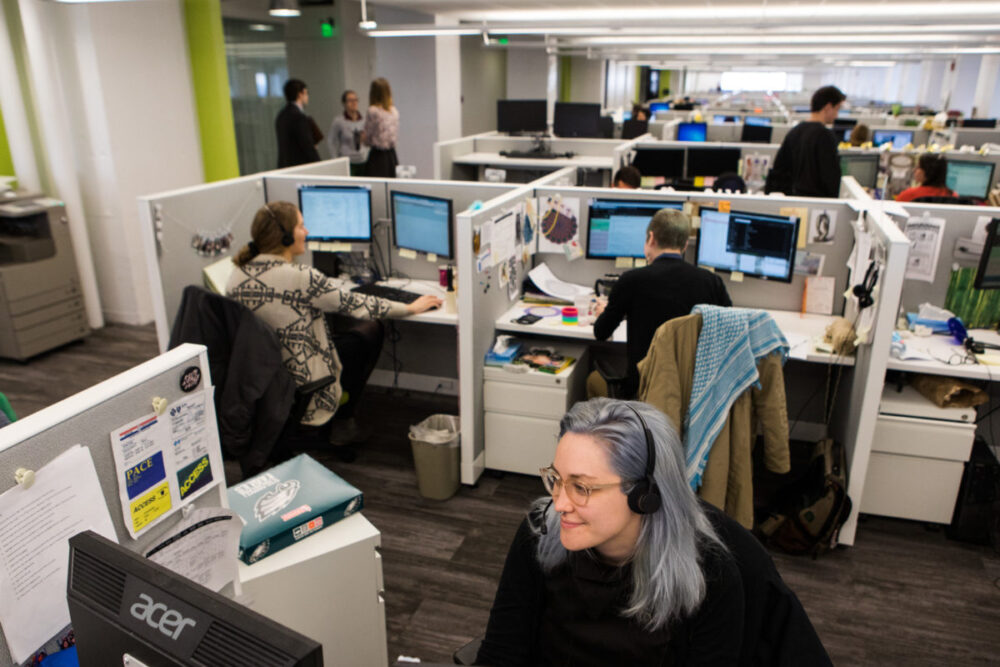This story is part of a series called Combating Poverty in Philadelphia and includes stories first published on Technical.ly’s social impact-focused sister site, Generocity.
What does poverty have to do with tech? As a tool, technology can be used to mitigate the effects of poverty. As a career path, tech can help its workers earn a living wage or grow their wealth. As an industry, tech can boost the economy of a city. Of course, those things don’t always happen. Here, we’re exploring what’s being done to make sure it does, locally.
In 2005, I took a weekly bus trip to sit in a cubicle and answer a hotline for Philadelphians who were struggling. Callers would range from matter-of-fact to distressed. Crisis has many tones.
My job was mostly to help these residents fill out cumbersome forms to access existing programs for energy assistance, SNAP benefits, legal aid and other services. Lots of times we’d chit chat. The goal was to make the process all feel entirely normal to access government aid because, of course, it is. It did strike me funny then that this entirely separate entity existed to help improve uptake of programs that already existed.
That always comes to mind when I think of a memorable line from a Generocity contributor: Every nonprofit is a policy failure. That same year I was on hotline duty doing what I could, a much larger and more comprehensive effort was starting to combat this seismic gap between what government assistance programs already exist and what eligible people actually use them.
Banking executive Warren Kantor was frustrated by his own experience helping his widowed mother fill out government forms, so he founded Benefits Data Trust. The nonprofit’s mission is to put to work an estimated $60 billion annually in government benefits that go untapped nationally, including half a billion dollars in the Philadelphia region alone. The nonprofit positions itself as a primary effort to combat “the benefits access challenge,” as it’s called by Trooper Sanders, who was named CEO in fall 2019.
“We have made the democratic decisions through government to help people with their critical needs and invest in making our country stronger and better off,” Sanders said. “It is a powerful tool that isn’t being used.”
Last month, Benefits Data Trust earned a sizable lift in the way of a $20 million unrestricted donation from the world’s newest, largest philanthropist, MacKenzie Scott. For context, that total represents more than 75% of the nonprofit’s entire $26 million in 2020 income, according to its 990. Following other similar stories, Sanders received an anonymous email requesting a short phone call to share news of a donation and in a “seven-minute conversation” he found “second Christmas morning.”
“It allows us to put a down payment on the work we’re going to do for the next decade to make the benefits access challenge go away,” said Sanders.
Sanders, who was born in Detroit and studied at the London School of Economics, speaks in a way that reflects his data-powered nonprofit. He describes himself as “both optimistic and realistic.” Increasing the uptake in programs ranging from housing and food benefits to Pell grants would impact 10 to 15 million Americans annually, he said. “It is a meaningfully big number and it is solvable,” he said.
BDT’s primary innovation is the use of data matching. In its simplest form, the group compares, for example, those who are enrolled in Medicare but not SNAP benefits (once known as “food stamps”) or vice versa, and works to convert those people into the other. They help existing community groups navigate the “intentionally difficult” systems.
Philadelphia remains poor for an interwoven set of problems.
More broadly, Sanders wants to remove the stigma associated with government programs that especially focus on those in poverty.
“The home mortgage deduction is effectively welfare, and we celebrate that,” Sanders said. “Most of us are one or two unfortunate turns away from being in a spell of challenge and desperation where we might need public benefits.”
I asked Sanders how benefits access can impact efforts to combat poverty. Just how many people can be lifted out of poverty if all of these programs were used to their fullest?
For a data-centric guy, he’s cautious about that. Though they range, many of these programs are meant to serve as a safety net. They alone won’t have a “structural and intergenerational impact on poverty,” he said.
For example, Philadelphia remains poor for an interwoven set of problems.
“The reasons why the challenge in Philadelphia exists are both many and few,” he said, referring to countless small contributors that might also be simplified into a small number of causes like disinvestment and racialized policies that have “embedded structural poverty in Philadelphia.”
The $60 billion that goes unclaimed annually in the country, including $450 million in the Philadelphia area, are tools to address poverty and opportunity. BDT’s vision to close that gap in a decade is backed by far bigger money than the tiny nonprofit I visited weekly almost 20 years ago.
“Solving systemic inequality and racism is necessary — and it also wears people down,” Sanders said of those big, complex root causes. “Tackling the benefits access challenge is actionable, uniting and it’s something we can do in a realistic time frame to get something done.”
Join our growing Slack community
Join 5,000 tech professionals and entrepreneurs in our community Slack today!
Donate to the Journalism Fund
Your support powers our independent journalism. Unlike most business-media outlets, we don’t have a paywall. Instead, we count on your personal and organizational contributions.

I know civic technology. This is not civic technology.

Philly restaurant analytics startup ClearCOGS raises $3.8M — thanks to its Chicago presence

State-run immigrant support offices are stuck in limbo across the mid-Atlantic


